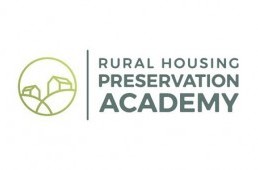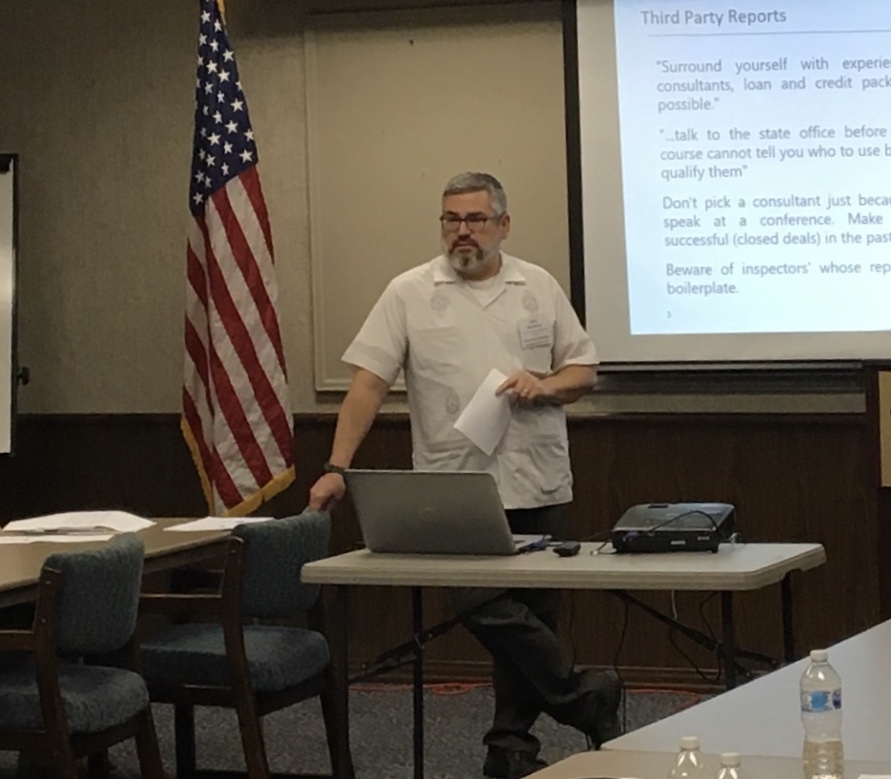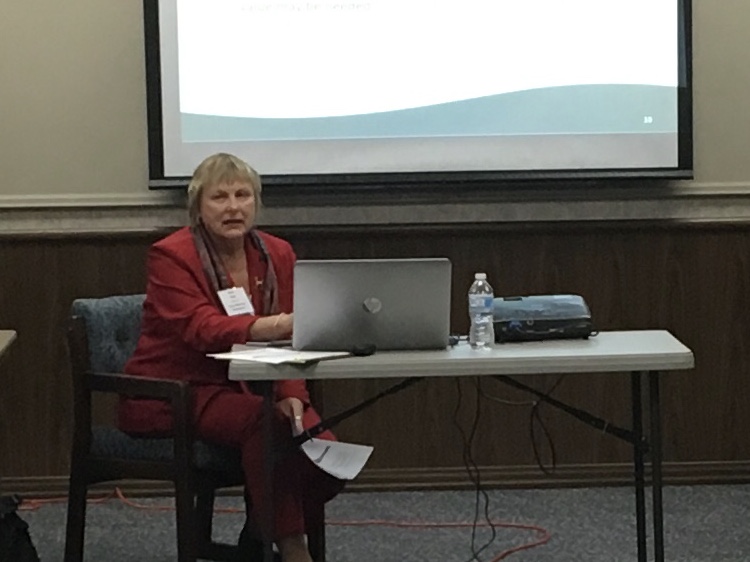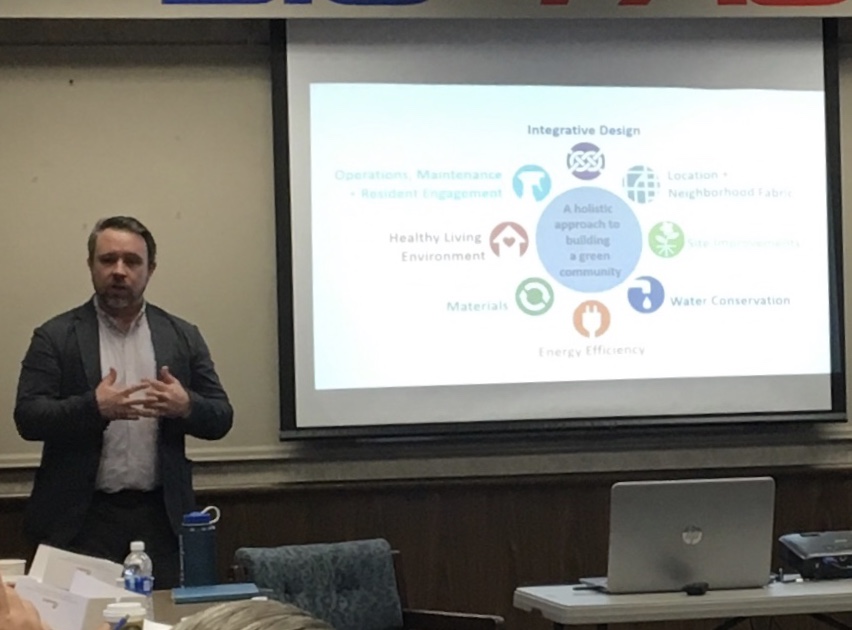
This is the second in a series of blog posts chronicling the Rural Rental Housing Preservation Academy. TSAHC, the Federal Reserve Bank of Dallas, Enterprise Community Partners, the Rural Rental Housing Association of Texas and Motivation, Education, & Training, Inc. are partnering to present the academy which is a series of no-cost training and peer learning sessions designed to help rural housing providers and nonprofits acquire and/or preserve USDA housing in their respective communities. Special thanks to the Capital One Foundation for providing financial support for the academy.
Attendees participated in "Session 2: Overview of USDA Rural Development Transfer Process" last week in Temple. This is a recap of that session provided by Julie Gunter, Director, Community Development at the Federal Reserve Bank of Dallas.
Edd Hargett, recently appointed Texas State Director for USDA Rural Development (RD), opened the session remarking that USDA is proud of the staff in Temple and thanking everyone for what they do for rural Texas.
Understanding the Transfer Process (Supporting Materials)
Russell Kaney - Enterprise Community Partners
Tim Chandler - National USDA Rural Development
Mr. Chandler reviewed key elements of the transfer guidelines, what constitutes an eligible owner, the feasibility analysis, Capital Needs Assessment (CNA) and other key considerations. He emphasized that at the earliest opportunity, you should talk to your RD office and let them know your intentions.
Elements of the Transfer Process: Underwriting Template, etc. (Supporting Materials)
Tim Chandler – National USDA Rural Development
Jonathan Bell – Texas USDA Rural Development
Speakers noted that the most important part of the transfer process is making sure the package of documents is complete and that nothing is in draft form. RD will work with applicants if paperwork is incomplete.
Regional Underwriting
Tim Chandler – National USDA Rural Development
Mr. Chandler underscored the importance of the appraisal, a pivotal part of underwriting. RD is working to get more Texas appraisers trained on the process and can provide a list of recommended appraisers.
Case Study on a Transfer (Supporting Materials)
Tim Chandler – National USDA Rural Development
Mr. Chandler emphasized that transfer applicants must adhere to USDA's most recent Guidance Letter when conducting a CNA as part of the transfer process. He cautioned against committing to a sales price and dedicating too much money to service providers, including appraisers, until you get sufficient feedback on the transfer from USDA RD.
Pitfalls and Roadblocks - What to Know: Timeline, Rent Limits, Seller Equity (Supporting Materials)
Tim Chandler – National USDA Rural Development
Larry Anderson – Rural Housing Preservation Associates/Get RD Done Right!
Speakers noted that the there are three components that must be balanced: (1) rehabilitation costs (2) seller payment and (3) soft costs (what the buyer/developer will earn). In a good market, this balancing works nicely, but in a poor market, the seller payment typically goes down. First and foremost, buyers should discuss Conventional Rents for Comparable Units (CRCU) with RD, because those will dictate the balancing act.
 Resources for 3rd Party Reports (Supporting Materials)
Resources for 3rd Party Reports (Supporting Materials)
David Danenfelzer (pictured right) – Texas State Affordable Housing Corporation
Mr. Danenfelzer emphasized that there are stricts requirements for some 3rd party reports like Environmental Site Assessments and providing a market study.
Seller Exit Strategies: Factors to Understand from the Seller’s Perspective (Supporting Materials)
Larry Anderson – Rural Housing Preservation Associates/Get RD Done Right!
Tim Chandler – National USDA Rural Development
Mr. Anderson presented seller exit strategies and reviewed key preservation issues to be considered.
Capital Needs Assessment and Final Design Submittal (Supporting Materials: Part 1, Part 2, Part 3)
Kerry Elder– Texas USDA Rural Development
Tim Chandler – National USDA Rural Development
Michel Mitias – National USDA Rural Development
Brian Sutherland – Tennessee USDA Rural Development
Mr. Elder, an architect and consultant to RD staff, reminded participants that the CNA process is dictated by USDA guidance in the form or unnumbered letters each year. There is an "as-is" CNA followed by an "as-improved" CNA. When it comes to finding a consultant to execute a CNA, their experience matters more than the size of their firm.
 Appraisals (Supporting Materials)
Appraisals (Supporting Materials)
Joann Sette (pictured right) – Texas USDA Rural Development
Tim Chandler – National USDA Rural Development
Ms. Sette presented "How to Save Time and Energy (and Money) in MF Lending." Her solution in a word is "collaboration,” and upfront efforts pay big dividends. Appraisal requirements come in form of a Property Information Form from RD. If possible, provide a survey to your appraiser.
 Rehab & Retrofits
Rehab & Retrofits
Ray Demers (pictured right) – Enterprise Community Partners
Johnathan Bell – Texas USDA Rural Development
Mr. Demers presented the Enterprise Green Communities Certification Program which is currently offered in 29 states and worth 40 points on the USDA Multi-Family Preservation and Revitalization Demonstration application. He noted that Enterprise has built many tools into this program for people who are new to sustainable development, including providing an architecture student to intern with a nonprofit development organization.
More Resources and Closing
Russell Kaney – Enterprise Community Partners
Tim Chandler – National USDA Rural Development
Jonathan Bell – Texas USDA Rural Development
Mr. Kaney informed participants that a new USDA Multifamily Housing Nonprofit Technical Assistance Notice of Solicitation has been released. This will pay for technical assistance to nonprofits who want to purchase Section 515 properties and keep them in the program. This program will be focused on preserving properties with maturing mortgages that mature before 2030, and the expectation is that the entity selected to administer the program will get money out very quickly (by September 2018).
Mr. Chandler encouraged owners and managers to participate in USDA’s Summer Food Service Program, and Mr. Bell added that all borrowers in Texas have received notices about the program. There is usually little or no cost to the property owner or manager to allow their site to be used as a pick up site as the local food bank supplies all the food and the staff. Chandler suggested those considering participation should drop by one of the sites in their area to see the tremendous impact this program has in the community.
Mr. Kaney reminded particiants that Enterprise is still accepting applications for technical assistance grants as part of this academy. Contact him for more information.
Session 3 of the Rural Rental Housing Preservation Academy will be held April 11 - 12 in San Antonio, Texas. If you wish to attend that session or any other future session, please register here.
On the House blog posts are meant to provide general information on various housing-related issues, research and programs. We are not liable for any errors or inaccuracies in the information provided by blog sources. Furthermore, this blog is not legal advice and should not be used as a substitute for legal advice from a licensed professional attorney.
TSAHC reviews all blog comments before they are posted to ensure a positive experience for our online community. Off-topic comments; hostile, derogatory or deliberately insulting comments; and comments specifically promoting goods and services will not be posted.
Approved comments will be published in their entirety. Personal information will not be removed unless it pertains to someone other than the person submitting the comment. For more information, please see our Comment Posting Guidelines.
To remove a previously submitted and published comment, please contact Anna Orendain at [email protected].
If you have a question regarding any of TSAHC's programs, please contact us.